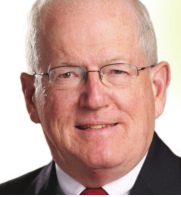With congressional districts finally drawn, state, federal contests take shape as primary
In my last column, it was not yet apparent how redistricting of New Hampshire’s two congressional districts would be decided. Shortly after writing, Gov. Chris Sununu vetoed two maps drawn by the Legislature, declaring them to be unfair. This kicked the issue to the Supreme Court, which had already named a Stanford professor as special master to create districts as equal in population as possible, while making the minimum change in present configuration.
After the governor’s veto, the court unanimously adopted the master’s plan, which shifted five relatively small towns from the 1st to the 2nd District.
The entire partisan dance, begun by the promise of the state GOP chairman that the Legislature, controlled by his party, would produce districts that assured at least one Republican congressman from New Hampshire, could and should have been avoided. Those who have been around New Hampshire politics for generations know that the districts have remained relatively stable, and people knew which district they were in and who their congressperson was. The representatives knew their districts, and acted on behalf of the constituents they know.
The various attempts to disrupt the history and tradition, on the assumption that results could be preordained, was wrong, and almost everyone outside the State House knew it was wrong.
The whole process appears to be strong evidence of why an independent redistricting commission should be created to propose fair districts, federal and state, for adoption by lawmakers.
Meanwhile, races for the September primary and November general elections started to become clearer as the filing period for office began shortly after the Supreme Court acted. Some filings were expected, such as by Governor Sununu, Senator Hassan and Congress members Pappas and Kuster. These incumbents start with name recognition, money and momentum. However, in an off-year election, Democrats face the tradition of being in the party which holds the White House, and which generally loses seats in Congress. Sununu, while very popular, faces possible voter fatigue as he seeks a fourth term, something only John Lynch has achieved.
Attempting to unseat the incumbents, and while not a complete list, are Sen. Tom Sherman of Rye, seeking the Democratic nomination for governor, the most prominent of those filing. State Senate President Chuck Morse, former Londonderry Town Manager Kevin Smith and retired Gen. Donald Bolduc are seeking the GOP nomination to face Hassan. Morse, while the best known in political circles, has never run for statewide office, so it will be interesting to see how he does as a candidate for higher office.
The mayor of Keene, with Sununu’s backing, filed for the 2nd District nomination, with other lesser-known candidates. Russell Prescott, a former senator and Executive Council member, was a surprise entry into the race to oppose Chris Pappas, and joined a number of hopefuls, including Matt Mowers, a recent New Hampshire resident who was the candidate in 2020.
It appears that the Executive Council members all will seek reelection, and their opponents face an election in slightly altered districts said to favor the four incumbent Republicans and one Democrat.
In the Senate, Morse’s seat is open, along with several others. Undoubtedly, there will be several changes in the Senate, with the big political question being who will preside, assuming a continued Republican majority, with Wolfeboro’s Jeb Bradley undoubtedly able to be elected president if he wants it, amid speculation that he might rather continue as majority leader.
The New Hampshire House is impossible to report on reliably, with its 400 members, about a third of whom change every two years. Each district is a different story, but voters need to study hard who is asking for their votes.
The presence of a contingent of quasiradical right-wing members in there, elected at least in part by voters who were not aware of their leanings, has proven to be a disruptive force both to members of the other party and also leadership in the GOP. It is not enough to know what party someone is in — it is important to know the ideas, philosophy and temperament of those seeking to represent us. Not knowing these things can lead to dangerous results, as has been seen the last few years in Concord, where a large contingent has opposed leaders like Sununu and House leadership, who are certainly conservative.
As the summer approaches, voters should take the time to do their homework. The alternative can be disaster.
Brad Cook is a Manchester attorney. The views expressed in this column are his own. He can be reached at bradfordcook01@gmail.com.